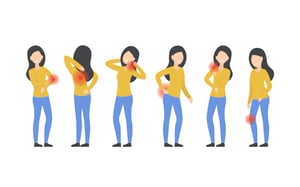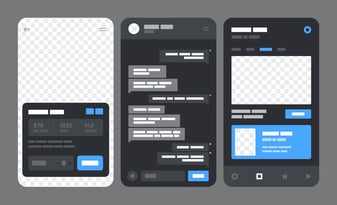
Improving Healthcare Chatbot Experiences with Interactive and Visual Adaptive Cards
The complexity and diversity of healthcare organizations requires an intelligent virtual assistant to support the wide variety of questions and requests from consumers and patients.
To simplify access to resources on a healthcare organization's website, Orbita taps the power of human-like natural language processing through an intuitive and easy-to-interact with virtual assistant (also referred to as a chatbot).
These types of chatbots emulate human dialogue while conversing with patients to provide a natural and convenient route to the desired information or outcome. Our virtual assistants have demonstrated how well they can support patients and ease burdens on healthcare providers through outreach across channels ('omnichannel') and even tapping into the nudge theory as a way to engage and capture patients' attention.
 Amid the COVID-19 pandemic and continued advancements in technology, patients are now consulting and relying on a plethora of online services more than ever. Chatbots support consumers on retail and hospitality websites and are increasingly being adopted more widely across the healthcare industry.
Amid the COVID-19 pandemic and continued advancements in technology, patients are now consulting and relying on a plethora of online services more than ever. Chatbots support consumers on retail and hospitality websites and are increasingly being adopted more widely across the healthcare industry. A dynamic way to improve virtual communication with patients is by leveraging the concept of 'Adaptive Cards' - think of this as an interactive screenshot that can communicate information at a glance within the virtual assistant. These platform-agnostic snippets of UI present a richer experience by providing and requesting specific and relevant data.
The collection of actionable content reduces redundancy and fragmentation, so the information relayed to healthcare providers is concise and clear. The integration of the editor directly within the Orbita platform simplifies the use of Adaptive Cards for providers, but how can they increase engagement and efficiency for the patient experience?

Let's say a patient is experiencing pain and seeks out your website to report symptoms and gather information on treatment options. The virtual assistant greets them upon arrival and guides them to the available symptom-checking services. When the patient is prompted to specify where the pain is occurring, an adaptive card can be deployed within the chatbot containing images of the different areas of the back. The patient can select the area that best represents the focal point of their pain. This helps provide comprehensive reports to the chatbot and medical professionals' records to produce a more accurate diagnosis and treatment plan.
Adaptive Cards alleviate the challenge of creating interesting and useful experiences for patients. Now, healthcare providers can meet consumers and patients where they are with interactive adaptive cards (no coding needed) to support an engaging experience in any scenario.

Take a look at the following simple design workflow and process of implementing Adaptive Cards with Orbita:
1) Within the Orbita platform, a WYSIWYG (what you see is what you get) editing environment provides an easy way to customize the cards and preview the feature without leaving the designer interface. Here, the card's font and colors can be tailored to represent a specific look or brand.
2) In accordance with industry standards, there is now a collection of templates readily available for redistribution and modification.
3) Adaptive Cards blend into the surrounding UI, presenting a uniform user experience for patients while visiting your website.
4) Once the card is created in the editor, it can be accessed in the Orbita 'flow manager' module to map its particular intent when it appears in the chatbot.

